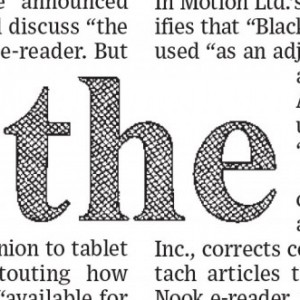
The. It is perhaps the most inconspicuous yet widely used word in the English vocabulary, yet do we really know its true meaning or even acknowledge its importance?
The Most Important Word
As the most commonly used word in the English language, the accounts for 7% of all words. Its etymology tells us that in Old English (a declined, gendered language) the took the following forms:

And dependent on the case, number and gender of the noun associated with the word, it also took on a variety of meanings such as the; that; who; this; he; she, them, and so on.
However, as gender structures and the Old English language changed throughout the Middle Ages, the word morphed into “þe”, becoming our beloved the by the 15th century.
A Favourite on Custom Merchandise
As the only definite article in the English vocabulary, the is as versatile as words come, able to be used in a plethora of ways be it in the singular (“the apple is crunchy”) or plural (“the apples are crunchy”), regardless of gender or formality (“How’s the family?”), alongside adjectives and nouns starting with any letter (“the aardvark, the xylophone, and the zebra”), and even metaphorically speaking (“the pen is mightier than the sword”). It is also the most popular word when it comes to marketing and promotional products.
On delving into many a dictionary and thesaurus, one is met with an array of attempts to 'officially' define the word the but none that really hit the nail on the head. From "used as a function word to indicate that a following noun or noun equivalent is definite or has been previously specified by context or by circumstance <put the cat out>" to "used as a function word before a noun or a substantivized adjective to indicate reference to a group as a whole <the elite>", for a non-English speaker trying to truly understand this small and seemingly simple word is near on impossible.
“Many sentences would be totally understandable if you were to omit the from them, but it wouldn’t sound like English,” says Richard Epstein, an associate professor of linguistics at Rutgers–Camden. “I think what’s more interesting is that if the isn’t used, people start to think you sound like a caveman, but the truth is, most languages don’t have such words.” And this is true when it comes to languages such as Korean and Russian. They just don't have a word for the.
No matter how you use it, the isn’t a hard word per se, but its definition is difficult to pinpoint and on further analysis proves the point that sometimes simple is, well, not so simple.
Sources:
http://mentalfloss.com/article/53555/what-does-mean
http://xefer.com//2005/02/the
http://news.rutgers.edu/camden/rutgers2013camden-pr-20130418#.VkAwMoTYwkg

